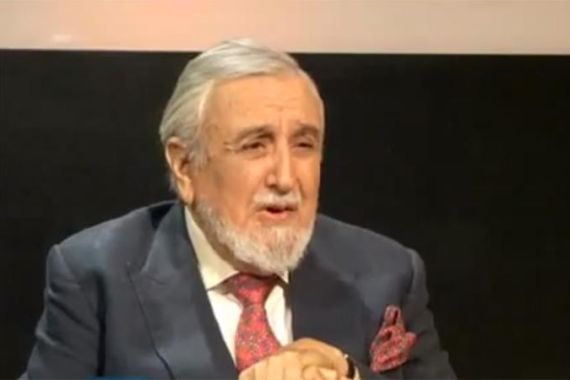Farewell, Pakistan’s Ardeshir Cowasjee
Outspoken media commentator was an irritant for governments, the urban mafia and the forces of bigotry.

For an eccentric who swore so much that he wasn’t deemed “fit” for live TV, Ardeshir Cowasjee was respected by his haters as much as his followers.
A relentless activist, philanthropist and a columnist whose prose on all affairs current was a must read, Cowasjee died in Karachi on Saturday.
He has left his impressions on whoever met him or read him.
Talat Aslam, senior editor of The News, says: “Cowasjee’s death represents the death of an old, far more cosmopolitan and tolerant Karachi. He was a Gujrati-speaking Parsi gentleman of the old school – profane, blunt, outspoken, fearless.
“Not many left. Wrote fearlessly against crooked builders, land encroachers and campaigned tirelessly in his columns for a city he loved and which he sought to protect from various mafias.
“His Sunday Dawn column were a must-read as they voiced the frustrations of an educated, urbane readership watching their country’s decline at the hands of crooked politicians, greedy builders. Disagreed with some of his ambivalent views on democracy (he was after all old school) and his obsessive Bhutto-hating but always respected him for his forthrightness, bravery and disdain for cant and hypocrisy.”
Abbas Nasir, a former editor of Dawn @abbasnasir59, wrote in his tweets:
Ardeshir Cowasjee, bold columnist, philanthropist, campaigner, chronic Karachiite, good friend, diehard Bhutto hater. Such a rich bag. Had lovely conversations with him during my time as editor Dawn. Relentless campaigner.
Very few people know Cowasjee quietly tried to support upright, young journos financially. He was an ardent critic of the religious parties who, according to him, steered Pakistan away from being a secular state.
Voice against brutality
Even then the chief of Pakistan’s largest religious party, tweeted this about him:
@SMunawarHasan Ardeshir Cowasjee was an outspoken writer. He raised voice against brutality and target killings in Karachi. He will be missed. RIP
But it wasn’t just the religious right who Cowasjee made uncomfortable. Known for his bravery and outright honesty, he fought long and hard battles against the entrenched land-grabbing mafia in Pakistan’s biggest city, Karachi.
The city’s mafia is well entrenched in the political parties which rule the city. Cowasjee took many of them to court and stopped many encroachments on public land.
His critics deride him for supporting the military and being against anti-democracy. But he was an opinionated and honest man who refused to cloak his feelings or words.
He started of as a friend of Benazir Bhutto’s father and the founder of the Pakistan People’s Party, Zulfiqar Ali Bhutto. But that friendship didn’t last long and he broke off all ties and became one of the staunchest opponents of corrupt politicians.
Cowasjee called Musharraf as the best of the worst lot and wanted him to put a decade-long ban on politicians who held office between 1988 and 1999. He argued that it was the only way to ensure the top corrupt political elite can be kept out.
Raza Rumi, a well-known Pakistani writer, says: “Cowasjee’s columns were opinionated sometimes, pandered to the military on other occasions, but they remained unique due to the honesty with which he wrote, and the no-holds-barred style that he affected through his pithy, direct style of writing. The courts and the governments, within a short period of time, had to take action in response to the issues he raised.
“As a secular urban citizen, he led a public campaign against illegal construction as well as the destruction of Karachi’s civic sense.
“Throughout his life, he opposed the Bhuttos and displayed consistency of his position.”
Unprecedented candour
Cowasjee turned to public activism through his writings, first as a contributor of letters, and later as a columnist.
The candour in his columns was unprecedented, and very soon he started to become an irritant for the governments of the day, various mafia in his native Karachi, and the forces of bigotry.
In this process, he acquired hundreds and thousands of followers in Pakistan and abroad, and articulated the aspirations of Pakistan’s majority that wants a peaceful, prosperous and rule-based country to live in.
His formidable legacy is the shaping of a discourse around the notion of “Jinnah’s Pakistan” – a plural polity with rule of law that Pakistan’s rapacious elites have abandoned since long.
Cowasjee’s articulation of this vision inspired many in the country, and will continue to do so in the future. In a country where extremism is growing, Cowasjee will be sorely missed by the liberal progressive forces.
Talat thinks Cowasjee will be remembered for his fearless championing of causes and his refusal to be cowed down by those wishing to muzzle his voice.
Eccentric and undeterred to the end, Cowasjee must have been deeply dismayed at what his beloved city and his beloved Jinnah’s Pakistan had become.
He only vouched for Jinnah’s short-lived government as the true leadership of the country. But despite calling his fellow countrymen a nation of bigots, chose to live and be buried in Pakistan – the only country he called home.